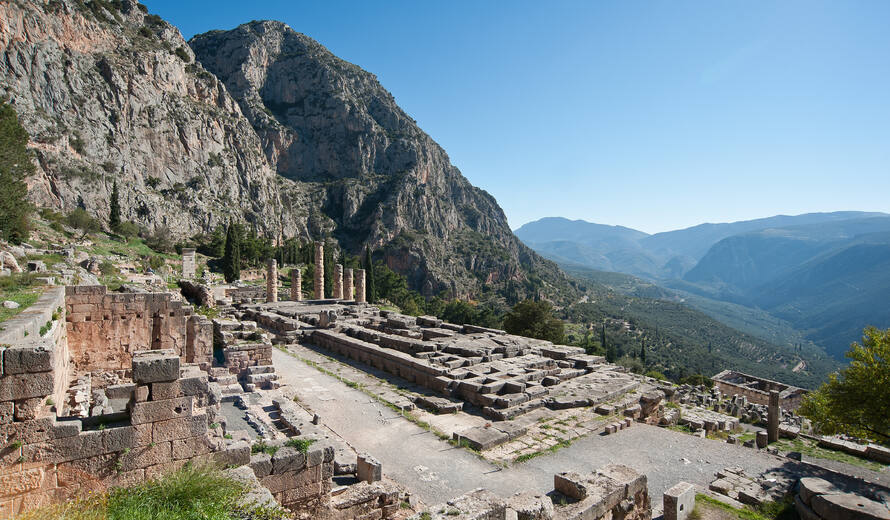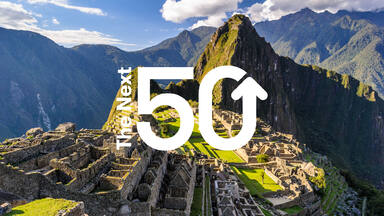50th anniversary celebration of the 1972 UNESCO World Heritage Convention, Delphi (Greece): The Next 50 - The future of World Heritage in challenging times enhancing resilience and sustainability
On the occasion of the 50th anniversary of the UNESCO World Heritage Convention, the Hellenic Ministry of Culture and Sports and the Permanent Delegation of Greece to UNESCO in cooperation with the UNESCO World Heritage Centre are organizing an international Conference in Delphi (Greece) on 17-18 November 2022, entitled: The Next 50 - The future of World Heritage in challenging times enhancing resilience and sustainability.
The Delphi Conference will now take place on 17 - 18 November 2022. These new dates are in tribute to the adoption of the Convention in November 1972, thereby allowing the Conference to mark the 50th anniversary of World Heritage.
The celebration of the 50th anniversary of the Convention for the Protection of the World Cultural and Natural Heritage will take the form of an international conference which will bring together several dozen experts from all over the world for two days on the site of Delphi.
Alongside representatives of UNESCO and the States Parties serving on the World Heritage Committee, the experts will take stock of the Convention’s achievement and examine the challenges it faces in the 21st century.
The event will be opened on Thursday 17 November at 11am by Audrey Azoulay, Director-General of UNESCO, and Kyriakos Mitsotakis, Prime Minister of Greece.
The Director-General of UNESCO will announce a three-pronged action plan to make World Heritage more representative, accessible and sustainable over the coming decades.
Thursday 17 afternoon and Friday 18 November will be devoted to round-table discussions on themes such as the priority to be given to Africa, the resilience of World Heritage in the face of climate change, sustainable tourism and digitization.
The challenges to the future of World Heritage
The announcements that will be made on the occasion of the 50th anniversary of World Heritage aim to address three challenges:
Representativeness
Fifty years after its creation, the World Heritage Convention has been ratified by 194 States Parties, giving it a truly universal scope. It has paved the way for the inscription of 1,154 sites in more than 167 countries, recognizing a great diversity of cultural and natural heritage.
Nevertheless, significant geographical disparities persist in the World Heritage List. While some countries have more than 50 inscribed properties, others have none, a is the case of 12 African States Parties to the Convention. The whole of Africa only accounts for 9% of World Heritage sites.
Representativeness also requires greater inclusion of local and indigenous populations, who should be able to participate fully in the process from the nomination of sites for inscription to their management. They should also be able to reap the benefits of inscription.
Accessibility
The inscription of sites on the World Heritage List recognizes their outstanding universal value to be shared by all of humanity. The Convention’s main purpose is to ensure that such properties are preserved and transmitted to future generations.
While sharing and transmission are the two pillars of World Heritage, much remains to be done to ensure that sites are truly accessible to everyone, and in particular to the youngest. To help meet this challenge in the years to come, the international community disposes of new tools made available by digital technologies.
Sustainability
Today, there are 52 World Heritage sites “in danger”. Almost half of them are located on the African continent. They require the deployment of urgent safeguarding measures.
Faced with multiple human pressures including urban development, exploitation of resources, pollution, and overtourism, as well the resurgence of conflicts, all World Heritage sites need better protection.
Climate change has become the number one threat to natural World Heritage sites. It is already having negative impacts on 34% of them, and on 70% of marine sites. By 2100, half of all World Heritage glaciers and all World Heritage coral reefs could disappear.
World Heritage in numbers
There are currently 1,154 sites on UNESCO’s World Heritage List:
- 897 cultural sites
- 218 natural sites
- 39 mixed sites (both cultural and natural)
- 43 transboundary sites (straddling the territories of two or more countries
52 sites are currently listed as being in danger.
In 50 years, three sites have been removed from the World Heritage List.
World Heritage sites are to be found in 167 countries.
The World Heritage Convention has been ratified by 194 countries.
Press contact


Delphi, Greece

